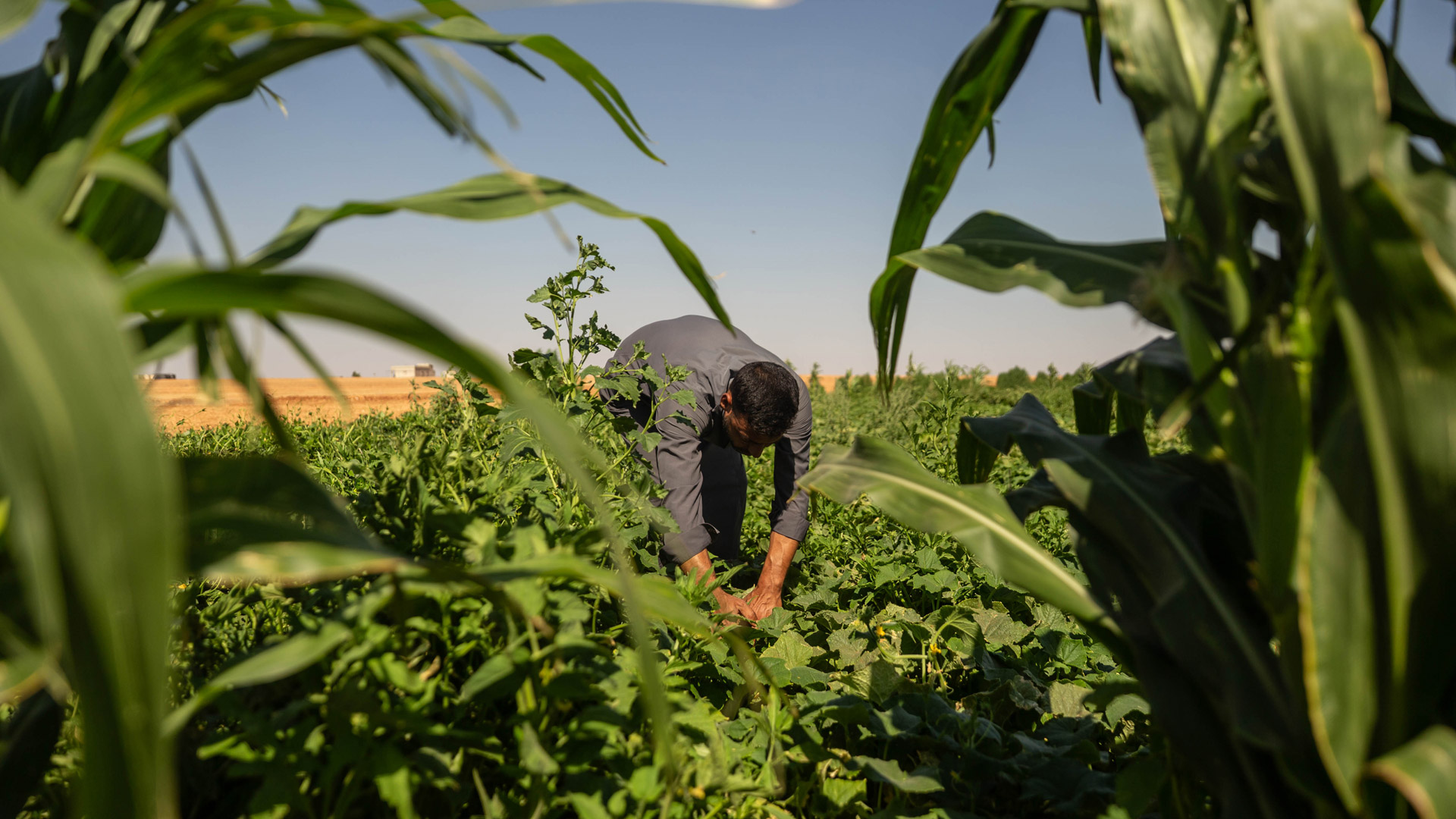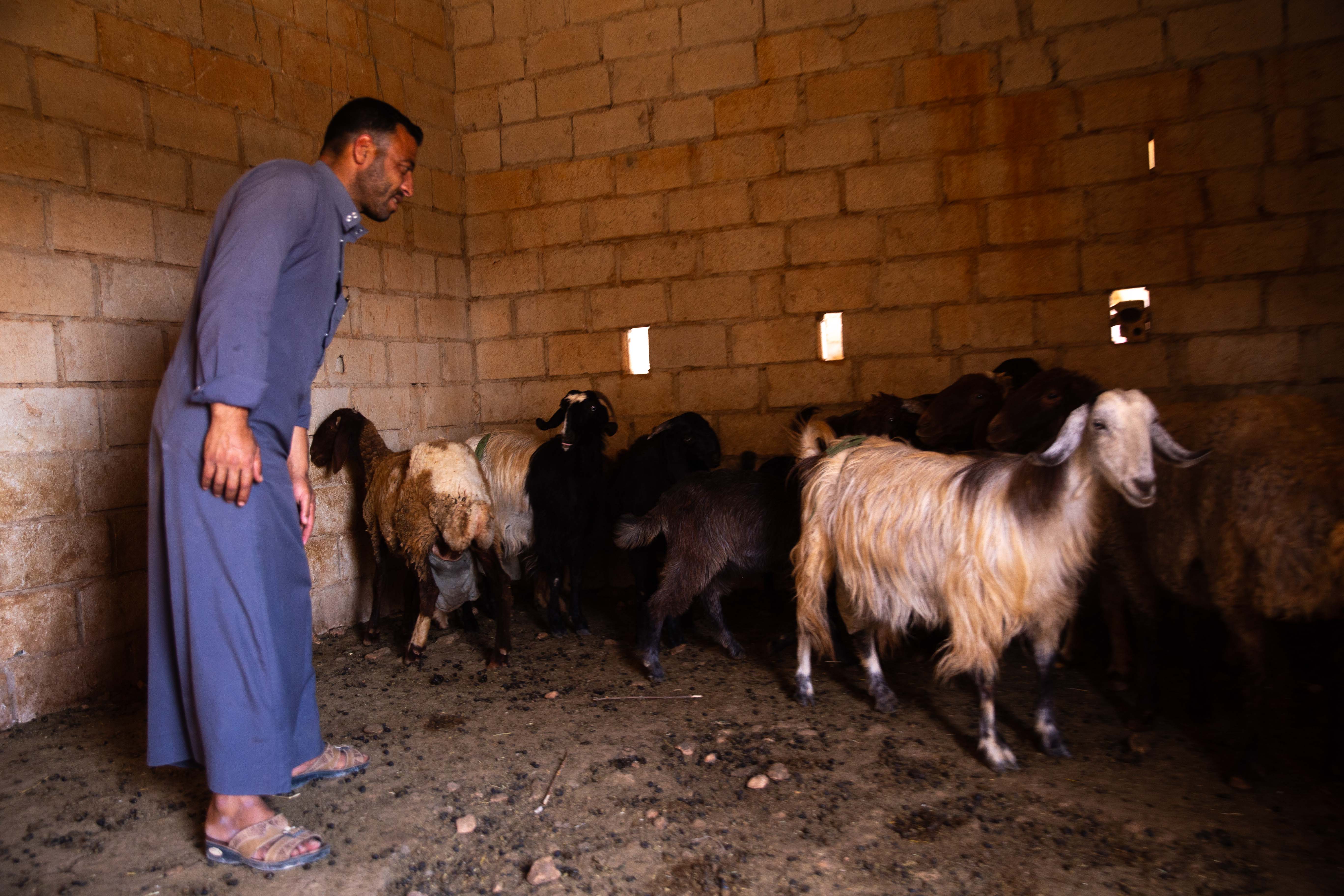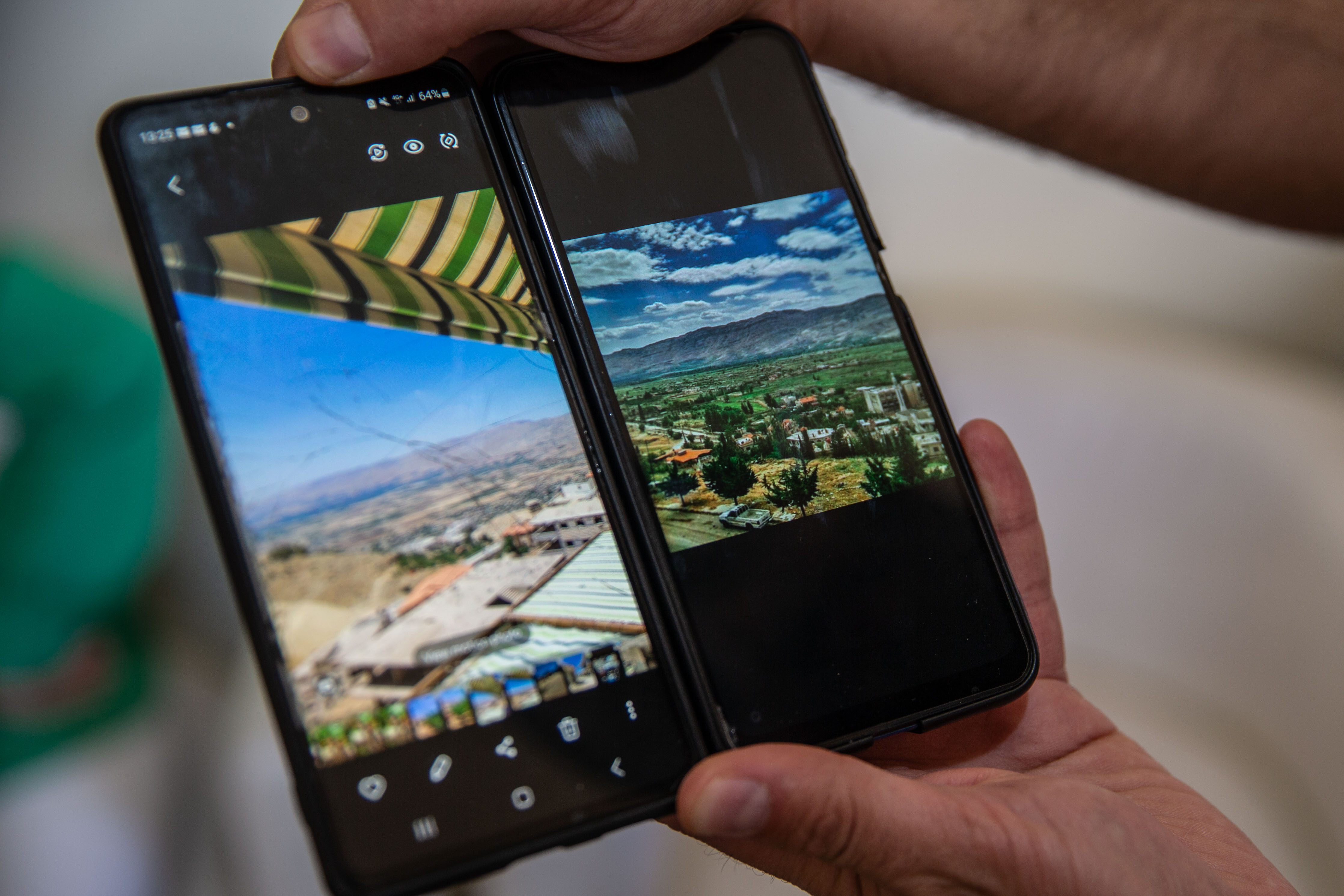Between exile and scorched land
Between exile and scorched land

.webp)
Barren mountains of scorched earth and volcanic stones surrounded Bilal Saleh’s crops in al-Buweida al-Zghireh, a small Syrian village close to Aleppo.
The farmer inspected the growth of his plants, mostly summer vegetables, and turned on a water hose to irrigate those that seemed to be suffering the most from the intense heat.
“This tomato is dying,” he told The Beiruter while pointing towards a dried-up plant. “We barely have any sweet water left in our wells, and the rest comes from 400m underground, it is sulphury and salty, not all plants can survive on it,” he explained with spite.
Bilal returned in 2023 from his forced exile of 12 years in Lebanon only to find his land burnt by a sudden drought, the worst Syria has known in over 60 years, according to the Food and Agriculture Organization. Everywhere around him, crops were failing, farmers giving up their land to livestock or quitting their jobs altogether.
“We’re planting only enough to survive; there’s no way we will make any money this year,” he muttered. “After all we’ve invested and worked, these are tough times.”
Bilal had fled his village when shells and missiles started flying overhead in 2013. The Syrian civil war was getting into full swing, and he sought security in Lebanon’s Bekaa Valley.
These projects help break down the barriers between us.
“Back then, I was working in traditional clay construction; I was welcomed and found many projects to work on,” he remembered, saying that he’d lived in Baalbek, Beirut’s Hamra area, Chouf, and Bhamdoun.
One of these jobs was in Buzuruna Juzuruna’s mudbrick farmhouse in Saadnayel, Bekaa Valley. The agroecology collective, comprising French, Lebanese, and Syrian farmers, was establishing a “seed library” for heirloom, local, and organic seedlings.
“I ended up following their workshops about organic agriculture and discovered this field, vast as an ocean, and I switched to farming,” Bilal recalls, his disheveled brown hair flowing above his glasses as he watered his plants.
In 2023, as he found himself unemployed once more and as his diabetes was getting worse, the newly converted farmer decided to return to Syria to seek cheaper medical treatment. At that time, large swathes of land around Idleb and Aleppo had been taken from the government forces by rebel armed groups such as Hayat Tahrir al-Sham (HTS), who would later topple the Assad regime.
“My family had been displaced there, so I decided to join them – but the journey was a hellish nightmare,” he recalled.

Azat Abu Bachir, a former Syrian refugee in Lebanon before being internally displaced, has set up a self-sufficient heirloom seed project on his farm in al-Thabe (Idlib Governorate). Syria, June 27, 2025
A bribe at every checkpoint
Over five days, he traveled by bus from the Bekaa Valley to Idleb, being stopped at several Assad army checkpoints on the way. “I had certificates allowing me to travel, but was also slated for military service – they had my name and made me pay them a bribe at every checkpoint to pass,” he said.
In the end, after having been extorted almost a thousand dollars, a huge sum for war-torn Syria, he arrived at a refugee camp in Sarmada (Idlib Governorate) where he started a heirloom seed farm, the technique he had learned in Lebanon.
He then moved to an agricultural village close to Afrin for a similar project until the Assad regime fell on December 8, 2024.
We barely have any sweet water left in our wells, and the rest comes from 400m underground, it is sulphury and salty, not all plants can survive on it.
“I immediately returned to my village, but was shocked to find it completely looted out and empty,” the farmer told The Beiruter, as he served a cup of steaming hot, sweet tea in his living room.
“All the furniture that you see, we brought back from our displacement, the Assad forces had stolen even the electricity cables,” he added. His well was badly damaged, inoperable. “It would have cost over $2,000 to repair it. As displaced people, we can’t afford that.”
His wife, Assia, and their children had joined him from Lebanon and even brought their cats with them. Now, their kittens were bouncing around the farm, playing among the chickens.
“There is nothing like home, we will overcome the drought to restore our lands and rebuild Syria’s environment and nature,” Bilal said with determination.
 Azat Abu Bashir creates natural fertilizer and pesticides from the droppings of his goats and sheep on his farm in al-Thabe (Idlib Governorate). Syria, June 27, 2025
Azat Abu Bashir creates natural fertilizer and pesticides from the droppings of his goats and sheep on his farm in al-Thabe (Idlib Governorate). Syria, June 27, 2025
Security concerns
The scorched earth is prohibiting many from returning. For Brahim Ali, a farmer originally from Raqqa but still living in Lebanon, the drought is delaying the return dreams of many exiled Syrians.
The Beiruter met him in Bar Elias at the offices of the Syrian-Lebanese NGO he works for, which conducted a (still unpublished) study on the subject.
"More than half of Syrian farmers in Lebanon do not yet want to return, largely because of the drought and the economic crisis," he explained.
"In Syria, they would need several thousand dollars to rebuild their homes and fields, whereas here they can live for a year on the same amount; they have work and a relatively stable situation," he adds.
Only 500,000 of the 2 million Syrians exiled abroad have returned home, according to UNHCR figures.
He fled the 2011 massacres in Daraya and was now waiting for more favorable circumstances to return. Brahim wanted to launch a social agriculture project using aquaponics in Syria, but was still waiting for authorization from the new Syrian government. And for the security situation to improve.
Only 500,000 of the 2 million Syrians exiled abroad have returned home, according to UNHCR figures.
"If I return to Raqqa, I might be in danger because of my stance against the Kurdish forces," the long-time activist told The Beiruter.
The situation there was dire, as tensions between its Arab residents and the Kurdish administration that controls it kept growing. Elsewhere in Syria, massacres and clashes continued between the armed forces of al-Sharaa's new government, armed Druze groups, Islamist factions, and militias affiliated with the former regime of Bashar al-Assad, while Israel occupied the Golan Heights to the south and conducted airstrikes elsewhere.
For this reason, Brahim preferred to stay in Lebanon. At least for now.
 Brahim Ali, a farmer and Syrian refugee in Lebanon, shows the Zabadani forest region (Syria) before and after the war. Bar Elias (Lebanon), June 30, 2025
Brahim Ali, a farmer and Syrian refugee in Lebanon, shows the Zabadani forest region (Syria) before and after the war. Bar Elias (Lebanon), June 30, 2025
Food sovereignty and cohesion
A few dozen kilometers away, on the eastern outskirts of Idlib, Azat Abu Bashir, 38, was also banking on agroecology to rebuild Syria after spending years displaced in Lebanon and Syria. He had launched an organic heirloom seed project, which he was growing with compost from his goats, chickens, and sheep.
His "Syrian Association for Organic Agriculture," of which he was president, brought together 37 farmers in the Idlib region and maintains ties with other similar initiatives throughout Syria. He knew Bilal, with whom he worked in Lebanon.
"These projects help break down the barriers between us. I traveled to Rojava to meet colleagues who had strong preconceived notions about the people of Idlib [they saw them as “backward and Islamist”, editor's note], but when they came here, they saw that this wasn't the case," he told The Beiruter.
His fields stood like a paradise in the middle of a desert landscape, organized according to agroecological techniques. "Here, roses attract pollinating bees and repel certain insects. There, a hedge protects the vegetables from the wind and erosion. The plants are spaced apart to avoid cross-pollination and to preserve the purity of the seeds," Abu Bashir explained as he strolled between the rows of tomatoes, eggplants, and other crops, picking a flower here, a cucumber there.
Here, roses attract pollinating bees and repel certain insects. There, a hedge protects the vegetables from the wind and erosion. The plants are spaced apart to avoid cross-pollination and to preserve the purity of the seeds.
Irrigation was done either by drip irrigation or via an ingenious system of tiny dams that control the stream’s flow, winding through the crops.
"Our goal is to preserve local seeds, redistribute them among farmers here free of charge to support them, and thus regain our food sovereignty," he added.
But the road to getting there is still long, and for now, he had to make do with the basics. "Between the cost of rebuilding our homes and fields and the losses due to the drought, we won't make any money this season. But we hope to sell some of our produce and canned goods in the future to be able to finance ourselves,” the former refugee told The Beiruter.
Yaser Shahrur contributed additional reporting.
*Names have been changed to protect the security of sources.


